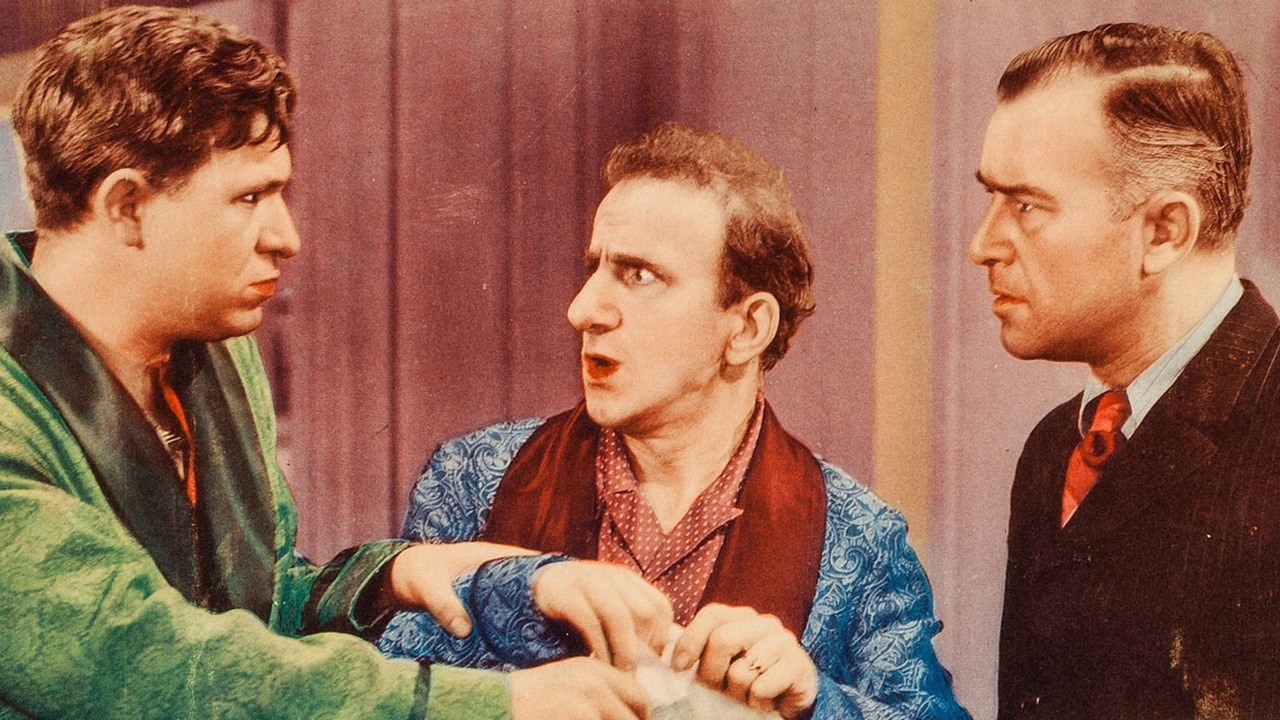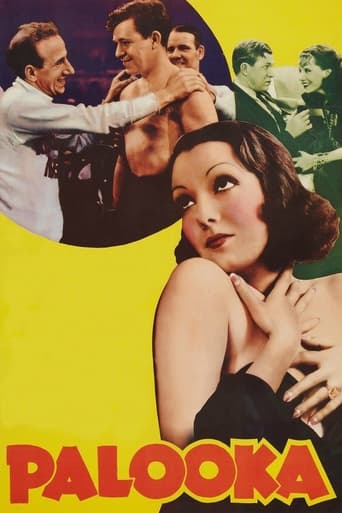StunnaKrypto
Self-important, over-dramatic, uninspired.
VeteranLight
I don't have all the words right now but this film is a work of art.
MonsterPerfect
Good idea lost in the noise
Jemima
It's a movie as timely as it is provocative and amazingly, for much of its running time, it is weirdly funny.
frankd-64766
I found this gem in the bargain bin but it is a must see for anyone interested in classic movies. I am a huge Jimmy Durante fan and he was terrific, but I thought Lupe Valez stole the show. She was an incredible comedic actress who died much too young. She lead a tragic life but you would never know it by her performance here. Jimmy Durante was just non stop in your face comedy. He was a great entertainer with heart and intensity. Also, William Cagney did a wonderful job as Al McSwatt and Marjorie Rambeau was unforgettable as Mayme Palooka. This had me laughing from start to finish and the ending was the biggest laugh of all.
mark.waltz
I'm referring to the audience and the women who love the men in the ring of course. The story starts in the early 1900's when the senior Palooka (Robert Armstrong) was champ and his wife (the ultra tough Marjorie Rambeau) caught him in a compromising position with a prize-fighting groupie (Thelma Todd). Kicking him to the curb, she doesn't expect their infant son to grow up to be in the same profession, but cut 30 years, and young Joe Palooka (Stuart Erwin) does exactly that after an encounter with boxing manager Jimmy Durante during which time he knocks out a current champ. Heading off to the big city without his mother's knowledge, he ends up one of the top fighters, and after beating up a challenger (William Cagney), he wins over Cagney's girl (Lupe Velez) and heads towards the championship much to his mother's chagrin.Between groupies Todd and Velez and fighting wife Rambeau, the women are just as prepared for a fight as the men in their lives. In fact, Rambeau walks out on Armstrong with no words unspoken, even giving her rival something she'll never forget. Velez isn't the tough cookie of the "Mexican Spitfire" series she did years later, but she's certainly more scheming and even gets to perform a nightclub number. Durante gets to perform a drunken version of "Inka Dinka Doo", his signature song. The lovable Louise Beavers plays Rambeau's housekeeper, commenting on country life, "The only rooster I want to see is a black one walking down Lennox Avenue towards me". Fast-moving and witty, this also has several moral lessons about the issues of what it takes to be a prize- fighter. You may confuse William Cagney with a certain other actor with the same last name with good reason.
Laurence Schwartz (lschwartz106)
Surprisingly spry given that this film is a premise to film antiquity. I always knew who Jimmy Durante was as a late boomer, but I had never seen him in his prime until this movie. I'm glad I did. He doesn't pretend to be an actor and delivers his lines with a uniform delivery. He's not a very funny man, but a weird oddity as an entertainer, the likes of whom would never ever be taken seriously in today's world of commodified entertainers. What's another point of interest in this film is the appearance of a William Cagney,brother of James....I assume the older of the two. Cagney's first scene when he shows up to his fight pie-eyed is a rather realistic and understated portrayal of drunkenness. There is plenty of drinking in this movie and many people get drunk. What's also an unexpectedly nice touch to this film is that the RELATIONSHIPS ARE BELIEVABLE. Filial conflict peppers this film in that the protagonist has to wrestle with his divided loyalty as cornered by his mother and father. Sometimes the film veers off into unbelievable ridicularity that could never respect the viewer; like when Durante wobbles drunkenly down the street, smashes a showcase window, then enters the display and starts his riinka-dinnk routine on the display's piano The least acquired appreciation for the film is its presence of Runyan-esquire toughs. These actors are CHARACTERS, not celebrities acting in obvious vehicles. Worth a look.
ptb-8
Hilarious pre censorship code boxing farce with Jummy Durante and Stuart Erwin, this homespun Vs city comedy about fixed boxing matches pre dates the Robert Wise classic by 15 years. It's an altogether different tone but with a similar theme: set-up boxing bouts. This one is played for laughs and sappy romance.....the attraction here definitely being the very rude and outright vulgarity of the comedy. Durante is flapping about snozzling his ridiculous comedy style with double meaning retorts and, glamorpuss bra-less nightclub floozie Lupe Velez whilst clearly not wearing underwear beneath her silk gowns has a neckline plunge so low it's a wonder viewers didn't see the map of Tasmania, so to speak. One outright hilarious scene with a French waiter saying "Oui Oui" repeatedly gets yelled at by an exasperated Durante who says "Alfonse! Will you stop wee weeing all over the place". Durante's theme song "Inka Dinka Doo" was obviously a gramophone hit in this era and gets a show spot all to itself. The laughter of Depression viewers in giant old theaters would have lifted the roof on many occasions in this one hour sparring match of one-liners. Everyone gets walloped, even Mother belts Hubby's showgirl pick-up square on the jaw in reel one. Stuart Erwin plays his usual "aww gee" hick character, and James Cagney's lookalike brother (astonishingly so) William, plays Mc Swatt the bad dude boxer also chasing Lupe's hemline. It's a very funny film. The DVD disc available in shops in Oz is OK, more like a DVD rom with some grainy pixilation. Made by Reliance Pictures, who sound like Majestic or Liberty or Chesterfield Pictures, all poverty row outfits of the time, I have a suspicion it is again, a faux Tiffany Production: they folded in 1932 but clearly kept the lot running as various other "name" brands used the facilities. The production values of PALOOKA a very good with the style of decor and design of a Tiffany Production.

